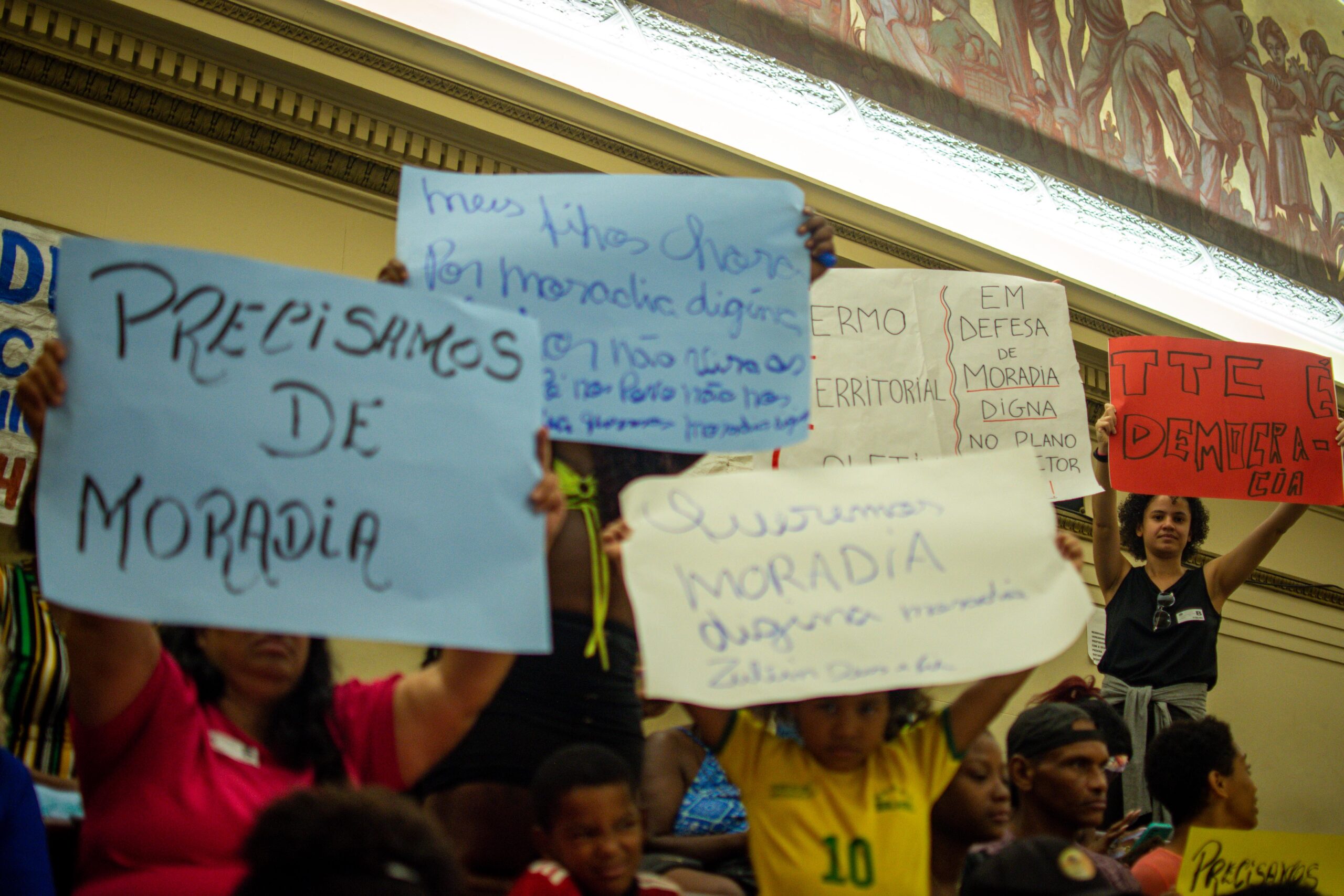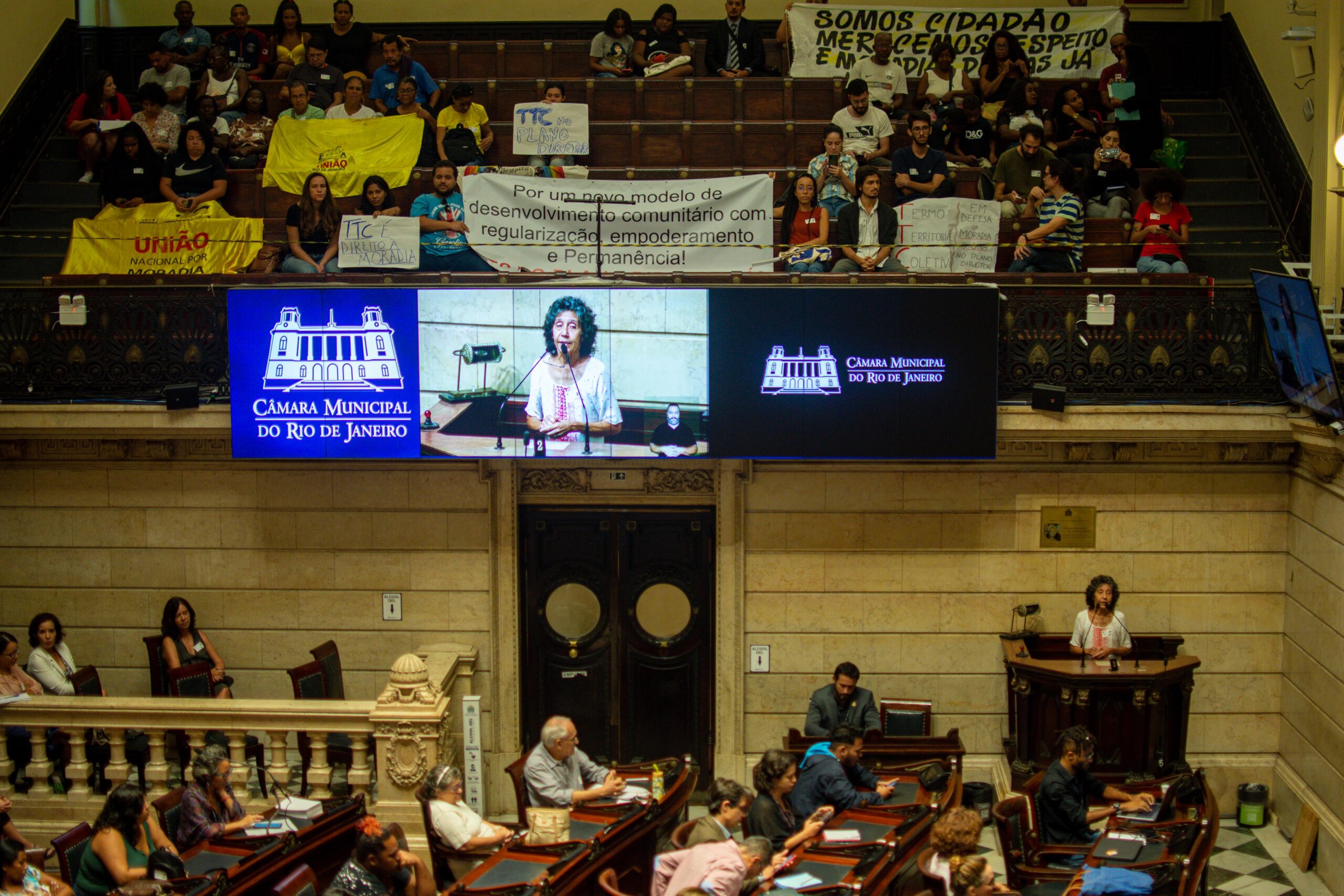
June 2023 marked a significant step towards victory for housing rights advocates in Rio de Janeiro. City Hall decided to reverse its prior decision and restore a provision to encourage Community Land Trusts (CLT) in the city’s 10-year master plan, currently being debated by City Council. This decision restores the CLT model in the draft bill of Rio de Janeiro’s City Master Plan. On June 28, the City Council held its first debate and vote on the new bill and approved some of the Mayor’s amendments. The next City Council session to debate the Master Plan is planned for September.
When the post-pandemic resumption of Rio de Janeiro’s master planning process was announced in 2021, numerous civil society organizations organized to ensure active participation in the discussions and influence the direction of urban policy. Despite criticism of the decision to conduct this debate during one of the toughest periods of the coronavirus pandemic, when popular participation was drastically limited, the debates were attended by diverse groups from organized civil society, who were able to express their views and suggest proposals for the new plan. The result of this process was the Master Plan Draft Bill (PLC nº 44/2021), debated during over 20 public hearings held by the legislative branch.
Standing out in the plan is the inclusion of an urban instrument new to Brazil—the Community Land Trust (CLT). In general terms, a CLT is a land management model that guarantees permanently affordable housing by focusing on the central role of residents in organizing their communities. In Brazil, it is being introduced as a new tool for land regularization in established, consolidated favelas. CLTs aims include fostering community development, guaranteeing the right to adequate housing, and ensuring communities can remain on their land. This is achieved by separating the land, which is owned collectively by all residents through a legal entity, and homes, which may be individually owned or leased by residents. Although little known in Brazil, the CLT has been adopted around the world and is internationally recognized as a sustainable and inclusive housing solution. The model was initially developed by activists in the US civil rights movement over 50 years ago. The CLT was included in the Rio City Master Plan draft bill as a result of public participation and represented a victory for sectors demanding the guarantee of communities’ permanence in their locations, as well as affordable housing. It was also a victory for those seeking to make Rio de Janeiro more socially innovative.
During the public hearings, community leaders, social organizations and urban planning professionals endorsed the inclusion of the CLT, with no open opposition to the new mechanism presented. Despite this level of support and with no justification given, the City made 215 amendments to the draft bill in the final stretch of master plan hearings, including the removal of the Community Land Trust provision from the legal framework as well as other significant changes.
This decision prompted immediate reaction from civil society groups. In public hearings to discuss the Mayor’s amendments earlier this year, numerous voices criticized the measure, which demonstrated City Hall’s lack of transparency and disrespect for the public participation which ought to guide the building of a city master plan. A wide range of people expressed their concerns—through placards, speeches at the City Council sessions, open letters to elected officials, posts on social media, and a petition—and called for the Community Land Trust to remain in the Master Plan. The legal instrument is considered an important alternative to guarantee housing rights for low-income families—a major challenge for the city and one of the greatest demands expressed throughout the hearings. Holding firm on their position, City Hall representatives involved in the hearings dodged the topic, and did not provide an explanation as to why a legal instrument much endorsed by the public had been withdrawn.

Fortunately, efforts to challenge the decision were not in vain. Following much public pressure, City Hall reversed its decision and reinstated the CLT in the Master Plan draft bill. Last week, the city government withdrew some of the amendments they’d introduced to the bill, including the one outright removing the CLT from the new plan’s urban legal framework. This news was greeted with widespread enthusiasm by all those calling for the CLT in Rio, pleased that their voices had been heard and made an impact. However, negotiations continue. The bill is now being debated by City Council and must be approved by councilors before it becomes a reality.
Despite this legal victory and City Hall’s change in position, there are concerns regarding alterations in the wording of the Community Land Trust clause. The first concern relates to a short paragraph stating that the CLT will still need to be regulated by a special, additional law, to be applied. This added requirement, although small, leads to a huge problem with the instrument’s use in the city, since it conditions its application to the creation of a specific law at the municipal level. N0 special law should be required because the CLT does not depend on any law to be implemented: the CLT simply combines several tools that already exist in current Brazilian legislation.
The second limitation to the potential full realization of the Community Land Trust instrument relates to the removal of an article central to the model, contained in the original proposal, which stated that the managing entity of the CLT (managed by a community’s residents) cannot sell CLT land. This clause is one of the CLT’s core principles which makes it a global benchmark for achieving housing security regardless of the economic phase of the surrounding real estate market (whether high or low). Collective land management combined with the removal of that land from the market all but eliminates both the risk of foreclosure/eviction cycles, and cycles of real estate speculation/gentrification. Residents can sell their homes, but the land is always protected; it is owned collectively by residents through the CLT. Within the arrangement of a CLT, land is not a commodity, but a collective good aimed at ensuring affordable housing. It is essential that this principle be retained.
The maintenance of the CLT sections in the draft bill of Rio de Janeiro’s City Master Plan is a victory for housing rights defenders. In a city where one in four people lives in a favela, urgent innovative solutions are needed which value the conditions developed informally by residents, guarantee communities can remain in their locations, and that those residents can advocate for and control future development on their lands.
The government often addresses favelas either through forced evictions or paternalistic enforcement of top-down “solutions” that don’t address local needs. These positions have rarely presented an effective solution for our city’s favelas and self-built settlements. It is time to try new ways forward, that involve valuing local knowledge, self-management, and the recognition of land not as a commodity but as a good that serves the collective. Voting to include the CLT legal framework in the Master Plan and ensuring its implementation in Rio is a crucial step.
